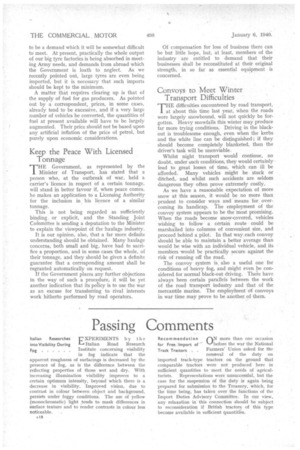Publicizing Road Transport
Page 20

If you've noticed an error in this article please click here to report it so we can fix it.
THE railways are not having it all their own way in the matter of propaganda. In fact, in our view and in that of some members of the public, their campaign in this respect has not been conducted very wisely, and has drawn comments which have not been altogether flattering.
There have been a good many criticisms as to certain discomforts of train travel, such as overcrowding, delays, lack of proper heating, and other points, which have brought out the remark that the public, as well as the railways, would like a square deal ; whilst the claim that the railways were able to carry on almost undisturbed by the recent weather conditions, while road transport was completely disorganized, was so far removed from the truth that it must have done the railways more harm than good.
Meanwhile road-transport interests, including the British Road Federation and certain of the associations, have lost no time in entering the publicity field, and this without an expenditure in any way approaching the huge sum which must have been allocated to this powerful effort by the railways.
Reference has already been made to some of these activities, but particular interest attaches to the latest scheme evolved by Associated Road Operators. This consists of sending some 500 gramophone records, each carrying speeches by Major Crawfurd and Mr. R. W. Sewill, together with certain remarks by Major the Hon. Eric Long, to important operators, etc., throughout the country. Some owners of vehicles are equipping these with loud speakers, and will attend race meetings, etc., so that the points put forward in the records can be broadcast to large masses of people. The records can also be employed for addressing smaller meetings, and, in fact, used wherever they may be considered to prove advantageous. The cost is being defrayed by voluntary contributions from the members, and the results of this noteworthy effort should far outweigh the expense.
This is all to the good, but each operator should himself be a propagandist on behalf of road transport. Every opportunity should be taken of replying to letters in the Press, or of refuting editorial matter adverse to road interests, whilst staffs and drivers should have the case for the road presented to them in concise form, so thai each can become virtually a salesman of road transport.
Those operators who are members of associations will, no doubt, be able to obtain suitable matter from the latter. The British Road Federation will certainly assist, whilst our readers who have carefully followed the course of events, as referred to in our pages, should have ample material at their command. We have ourselves received requests from individuals for such information, but the many demands upon our time render it extremely difficult for us to act as a propaganda centre, except through the columns of this journal.












































































